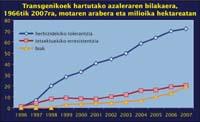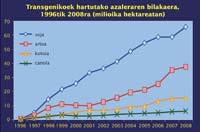Pulling the GM jacket
2009/05/01 Galarraga Aiestaran, Ana - Elhuyar Zientzia Iturria: Elhuyar aldizkaria

Leire Escajedo: Yes, commercial plantations began in 1996, but rather before non-commercial ones. And why have they spread so fast and so much? For I think they are notable advantages that have spread in the places that have spread, because it must be borne in mind that they have not spread in everything, but have concentrated in a few countries. They are the so-called macroproducers, who only cultivate varieties with remarkable advantages for them, especially those tolerant to herbicides or resistant to insects. It is very significant: many of the producers are from the Third World and are oriented to the production of raw materials for the first world.
Jose Ram n Maule: This expansion has occurred within a globalized commercial and productive model. In this model, some countries are suppliers of others. For example, soy produced in Argentina serves to feed American cattle. And if it weren't for that globalization, that technology wouldn't have developed. American corn is also exported.
O.T. No. In addition, much is intended for distribution as human aid. The US gives half of the human aid that is distributed worldwide, much more than Europe. And it's usually not in money, it's about selling cheap food.
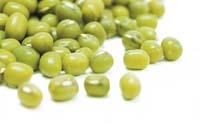
The idea that corn distributed by the US In Africa was transgenic occurred around 2000 and some countries waived this aid. Subsequently, the US clearly explained that 100% of the food they offered was transgenic. Many developing countries cannot oppose this because they need that food. Then, some countries decided to accept only as it was not cultivable (flour, etc.) to avoid the risk of sowing transgenic seed.
Free announcement : It is a very significant case. Human aid maize is one of the economic engines of the United States. It generates a million jobs in the US, that is, they do not help for their generosity but for their economic interest. In addition, it has been mentioned that this is a strategy to disseminate GMOs in other countries. A really malicious strategy.
O.T. : They have also paid for research projects on biotechnology in different places in Africa. However, these projects are embryos to achieve a regulation in favor of biotechnology. In Africa, however, they do not support the production of GMOs, as they fear the loss of market members. In reality, although Europe has been very supportive in other things, it has not been generous, so rigorous in traceability that it is generating problems to other countries.
In India and China, for their part, biotechnology projects are being developed by their own, using their own resources. In Africa it is not so, and it is evident the American aggressiveness to get into it. However, I don't think it is very different from the strategies used by the US. in other topics, for example, if we look at the textile market we will see that they act similarly.
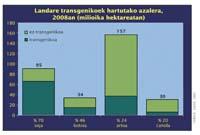
O.T. : That's it. As Joserra has said, the economic model is not fair. Now there is a focus on GMOs that make us see many miseries, but they are not created by them. If we look at coffee, tobacco, the textile industry... we will see something similar.
Free announcement : Okay, but with GMOs the system narrows a bit more. For example, Latin America has an export agriculture model, and GMOs reinforce their dependence on the US.
O.T. : Yes, maybe because food is strategic. Food is essential and also works with species of great importance in the feeding of animals and people. This endangers food sovereignty.

Free announcement : Speaking in general is very difficult. I have analyzed maize and soy in two contexts, Spain and Latin America. For example, the transgenic soy produced by Argentina serves to feed the animals of the first world. This involves single-crop agriculture, on large surfaces, and requires a lot of machinery to herbicide, harvest... That is, it conditions a productive model. Thus, the agrarian production model is changing and the small producer has no place in the new model. This is what is happening, not only in Argentina, but also in Uruguay and Paraguay, among others. One of the biggest problems of these countries is that people are migrating to cities because of the surplus of people on agricultural land.
At the political level, we are already seeing that soon Argentina will have to import food. By using everything to make GM soy, no food is made to feed people.
O.T. : And in addition, you will have to import processed foods, made by another, which of course are much more expensive than those made by yourself.

Free announcement : Not only that. Argentina is now fine, but within a few years, if China, for example, makes soy cheaper, the Argentine business will sink. And another thing: for its fiscal system, if the soy business is going well and you are Argentine, the country does not benefit from that wealth. For me that is very important politically.
O.T. : Yes, they are trying to get their varieties, they are looking for varieties of consumption in China so as not to depend on those outside. But, of course, as in the textile industry and around the world, then you will try to expand and become a global producer.
However, it must be taken into account that China has a great population problem, since they are many, and live in a small area of the country, because in other places it cannot be sown or do not have the necessary resources to live. So thanks to GMOs they want to get more out of the land. They have other objectives and hence derive their biotechnology projects. They say they talk about rice, but the genome of rice is very complex, and that I know there are still no significant advances, so there is no reason to think that some variety will be marketed in the short term. In any case, he will first have to direct his projects to solve his internal problems, since in China people are starving, although the government conceals it. But it cannot be ruled out that they intend to participate in the market.
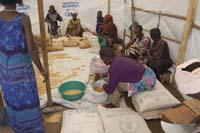
Free announcement : Yes. In Navarre, for example, transgenic maize is made to feed animals and farmers normally decide to plant normal or transgenic maize. In any case, the existing production model is not modified.
O.T. : There are two steps to making decisions. The first is carried out by scientists, who carry out studies from which they draw conclusions. In the second step there is someone who reads scientific reports. And from the first to the second there is a huge leap, since the studies scientists do not differ much, while among those who make the decision there is a huge difference from each other.
The socio-economic situation of the country is strongly influenced by the decision: whether it is a producer or buyer, the importance of the consumer, etc. For example, they intend to give an image that respects consumer opinion in Europe. In other countries, such as the US, market members are much more important than consumers.
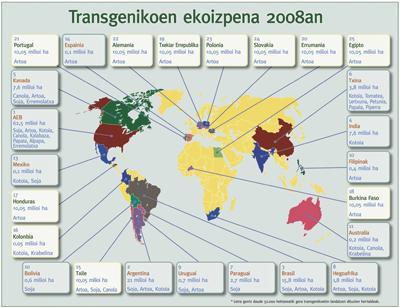
Free announcement : But I think that behind everything there is an ideological basis. The scientist does not investigate from nothing, he investigates in one direction and with one objective, and there is ideology. The same goes for politicians. For example, I have noticed that Spain is the country that makes the most GM maize in Europe; and when the European Union has held a meeting on organic farming to innovate in organic farming a minister is missing: National.
O.T. : But the competences are largely autonomous.
Free announcement : The Spanish Minister was invited to this meeting, who did not attend or give his place to anyone. This shows that behind there is an ideology.
In the case of the US, when it decided to equate transgenic to conventional varieties, the FDA, the food and drug agency, was under the control of Monsanto. In fact, a politician who worked for Monsanto made the decision. Do not forget that these technologies are created and managed by a large company to obtain benefits. And it is backed by the Government.
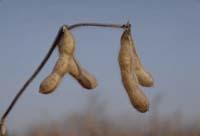
Free announcement : Yes. And when one thinks “this is what is it for? ", realizes that it makes no sense, since cattle is to eat, being one of the biggest mistakes of our diet the abuse of meat.
Another thing that is striking is that many Navarrese farmers plant transgenic maize. However, these farmers do not live on maize, they do so to continue receiving subsidies.
O.T. : What concerns me is demonizing biotechnology and closing doors to other products that may be of interest. I think biotechnology can offer a lot. In fact, some of the varieties being researched are very interesting, for example, to complete the diet of people with specific health problems. However, they are putting so many drawbacks to the varieties that are produced... Of course, they are the ones that have the most... I feel sorry that there is no place to develop biotechnology in another direction.
Free announcement : I feel sorry for something else. I am sorry that the solution to the problems of humanity does not come from other innovations, is not a more autonomous innovation that does not force us to go through the market. And is that we are talking about food and eating several times a day is or should be a fundamental right. That affects our health and I think it's not just a commercial good. You have to look for other solutions.
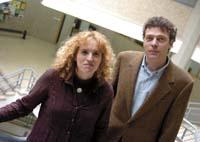
Therefore, there is a problem: the decision of those who want to do the normal is not respected, because it cannot be guaranteed that there are no transgenics between them. It is more serious the case of those who want to do ecological, since to have an ecological label can not have any transgenic. Therefore, the appearance of GM in its production would mean an economic loss.
You will find the full interview in this PDF. The interview was conducted before the approval by the Basque Government of the Decree on the Regulation of the Coexistence of Genetically Modified, Conventional and Ecological Organisms, but later we had the opportunity to consult it.

Gai honi buruzko eduki gehiago
Elhuyarrek garatutako teknologia



